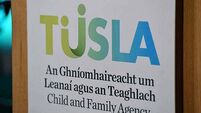CHI chair steps down after report finds use of springs in child spine surgeries ‘wrong’

Eva Osborne and Vivienne Clarke
The chair of the Children's Health Ireland (CHI) Board, Jim Browne, has stepped down from his role after a report found that the use of non-medical grade springs in child spine surgeries was “bespoke and experimental".
A report by the Health Information and Quality Authority (HIQA) determined their use was “wrong”.
In a statement released on Tuesday, Browne said: "I have served since 2013 as chair of the Children’s Hospital Group Board, and more recently as chair of the CHI Board since its establishment in 2019.
"Following discussions over recent weeks with the Department for Health, I now wish to step down and provide for an orderly transition to a new chair to allow for renewed enthusiasm and passion to guide this great organisation.
"I wish to convey my sincere apologies to the children, young people and families that have been failed by the care they received, following the release of the HIQA report today."
The HIQA has published 19 recommendations after investigating the implantation of springs in three children during surgeries to treat scoliosis of their spines between 2020 and 2023.
The surgeries were carried out by a surgeon at Children’s Health Ireland (CHI) at Temple Street hospital.
It found that the springs were made of a material called non-alloyed spring steel, which it said was different to the initial description of the springs provided by the surgeon during interview to HIQA.
Non-alloyed spring steel is not used for surgical implantation and is is known to corrode in the presence of moisture. There is very limited information available on its use or the risks of its use for implantation.
The springs were also not CE marked (Conformite Europeene), which indicates that they had been deemed to meet EU health and safety requirements.
"HIQA acknowledged the work done by Children's Health Ireland to date, to implement measures for the ongoing care for children and families affected by this review," Browne said.
"I wish to acknowledge and thank the staff of Children’s Health Ireland. My admiration for them remains steadfast – they continue to care diligently for over 200,000 children and young people every year, while working on the single biggest transformation of healthcare services in the history of this State.
"I extend my deepest gratitude to our medical professionals, support staff, and administrative personnel for their tireless efforts and commitment to patients.
"While we have faced significant challenges, it is also important to recognise the many positive developments that have taken place throughout the years."
Browne said he will now work with the Department of Health, Children’s Health Ireland Executive team and Board to "ensure a smooth transition to a new Chair person over the coming weeks".
'Wrong and unacceptable'
The HSE also issued a statement in response to the HIQA review.
It says: "The HSE accepts in full the HIQA report regarding the use of surgical implants at CHI. CHI is a HSE funded entity charged with responsibility for providing healthcare to some of the most unwell children in the country.
"The recommendations will be immediately followed through to implementation and we will also be seeking oversight of how CHI approaches the recommendations specific to them."
Commenting on the report, the chief executive of the HSE, Bernard Gloster, said what happened was "wrong and unacceptable".
"Given the role of the HSE in funding CHI I want to offer a sincere and unequivocal apology to the children and families affected by these issues. I will be requesting an early meeting with the Board and Executive of CHI to set out our clear expectations in all matters of governance and oversight.”
Minister for Health is 'shocked'
Minister for Health Jennifer Carroll MacNeill has given a commitment that the recommendations of HIQA in relation to governance of CHI will be implemented in full.
Ms Carroll MacNeill told RTÉ radio’s News at One that she had been “shocked at every element of this report”, that “a rogue surgeon, however well intentioned” had not been “captured and caught”.
While the surgeon in question had been well intentioned, what he had done had been wrong, she said.
“We have a series of processes that may have been there but were not followed. That's a problem for him but it's a much, much bigger problem for CHI and for the governance of the hospital and for CHI more broadly.
"And that is an issue of culture but it is also an issue for process. I thank Hiqa for their recommendations which I can assure will be implemented in full. But this is a major governance issue for CHI.”
When asked if she had confidence in the board of CHI and management of Temple Street hospital, the Minister said there was now a new chief executive of CHI with whom she had been working closely on a range of issues.
“What I need to do is reflect on the board and reflect on the next chairperson and the steps that are taken towards that, so that is something that I will do, but I am looking at the governance more broadly as we move to the new hospital and how that works.”
“What I want to see is the appropriate governance structure in place to make sure that we have clinical leads who are managing each team.
"What I want is that every consultant who is employed in the Irish state in children's health and everywhere else knows that they are not a single fiefdom, that they work within a hospital system, that they are public servants paid by the taxpayer and that they follow rules set by us in an appropriate governance structure.
"That applies in children, in the paediatric world and everywhere else, what I want is a culture where people who see things that are clearly wrong not only can step forward and say them but must step forward to say them.
“And this report I think identifies all of those different problems both from a culture perspective and from a process perspective and for the new hospital. And it's important to say that this isn't in every specialism across CHI, across paediatric services more broadly, there are areas that are going very well.
“We are far too often dealing with poor communication between hospitals or consultants and hospital staff and families. Families need to feel heard, they are their children's best advocate. That is always the case and there needs to be very, very clear satisfaction by families about how their child is being cared for.
"But you're right to identify it was thoroughly uninformed consent. How could you consent, how could you possibly consent and when your child is so young and in need of help of some kind you're in a very vulnerable position and I think hospitals really have to understand how vulnerable patients and their families are at those critical moments."
Ms Carroll MacNeill also confirmed that there are two external reports ongoing into children’s spinal surgery services and said that she would respond to them.




